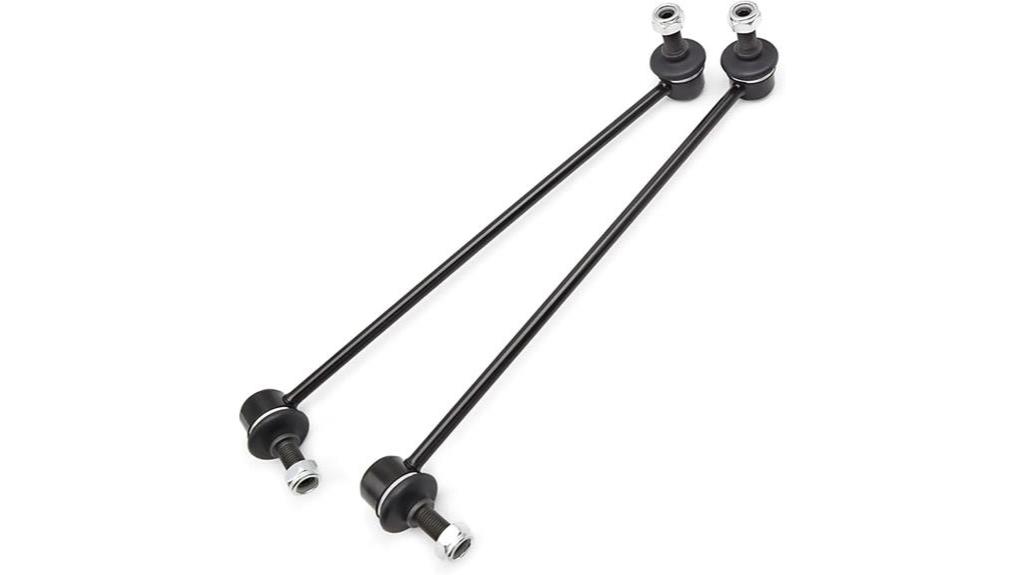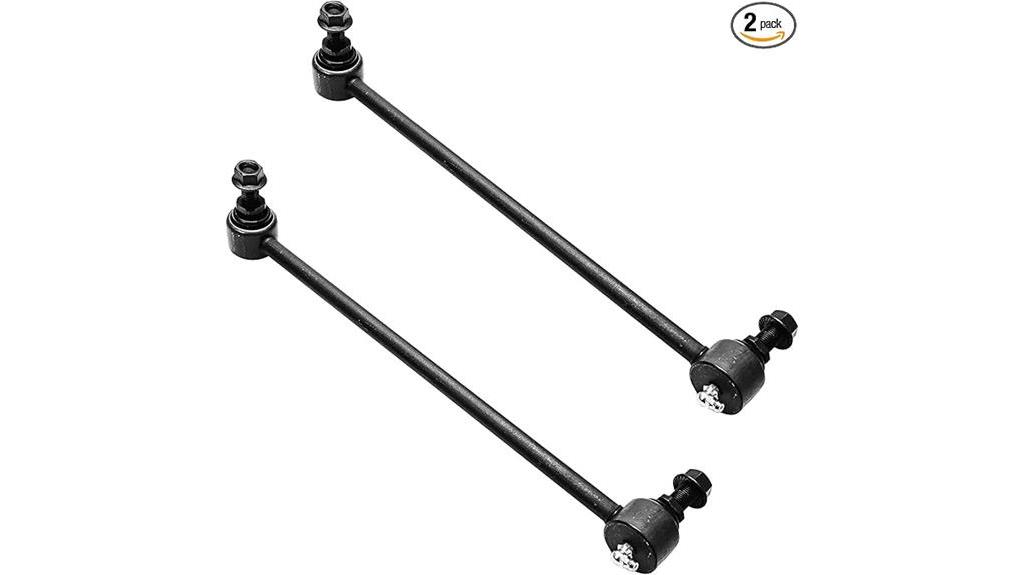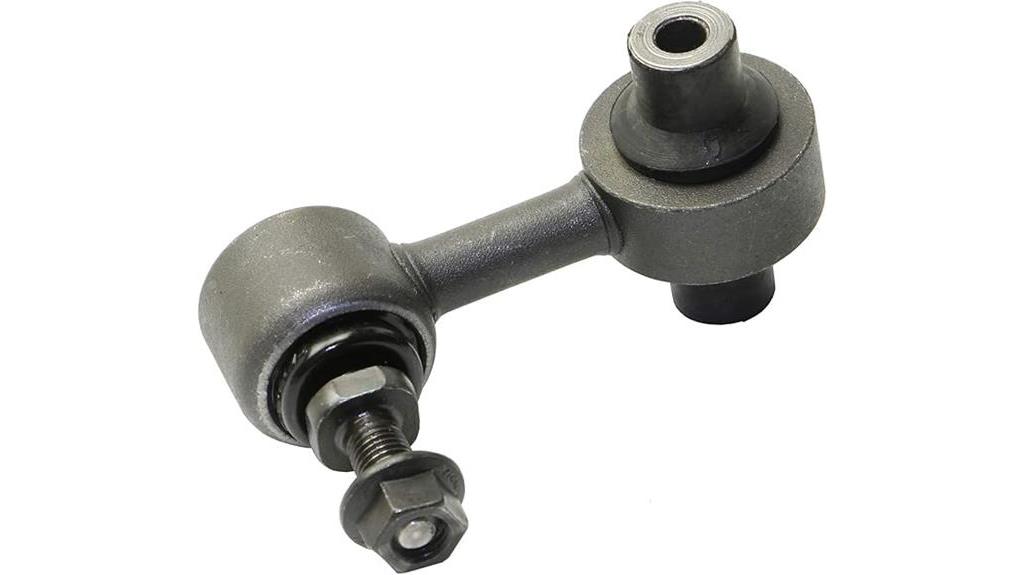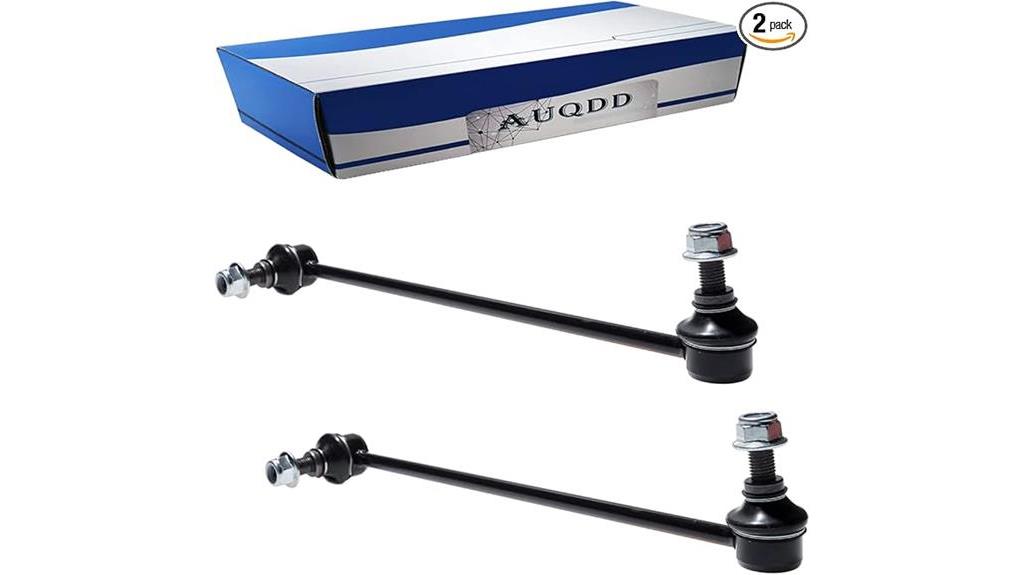Imagine steering tight corners with your Volkswagen GTI, feeling the car grip the road as if it were glued to the asphalt. Upgrading to the right sway bars can make that exhilarating experience a reality, enhancing both handling and performance. With a variety of options available, each with unique features, it's crucial to find the best fit for your driving style. So, what are the top choices that can transform your ride and give you that competitive edge? Let's explore the five best sway bars tailored for your GTI.
Quick Takeaways
- K80478 Front Sway Bar Links are highly rated for GTIs (2007-2014) and enhance stability with a solid 4.8-star customer rating.
- Detroit Axle Front Sway Bars come with a 10-year warranty, ensuring durability and compatibility with Jetta and Passat models (2005-2018).
- MOOG K750809 Suspension Stabilizer Bar Link offers high customer satisfaction and is made from durable cast steel specifically for Volkswagen Tiguan.
- 2Pcs Front Sway Bar Stabilizer Link is compatible with various Audi and VW models, manufactured in an ISO9010 certified facility for quality assurance.
- Upgrading to performance sway bars minimizes body roll, improves cornering stability, and enhances overall driving dynamics for your Volkswagen GTI.
K80478 Front Sway Bar Links Suspension Stabilizer Bar Link Kit (2PCS)

The K80478 Front Sway Bar Links Suspension Stabilizer Bar Link Kit (2PCS) is an excellent choice for Volkswagen GTI owners looking to enhance their vehicle's handling and stability. Weighing just 2.12 pounds and measuring 15.43 x 3.23 x 2.87 inches, this kit includes two front sway bar end links, designed to replace worn components. Compatible with various Audi and Volkswagen models, including the GTI from 2007 to 2014, it effectively reduces clunking noise and minimizes body roll during turns. Users can expect improved suspension balance and less uneven tire wear, ultimately enhancing their driving experience. With a solid customer rating of 4.8 out of 5 stars, this product proves to be a reliable upgrade for performance-focused drivers.
Best For: Owners of Volkswagen and Audi vehicles looking to replace worn sway bar links for improved handling and suspension stability.
Pros:
- Easy installation with a perfect fit for various models.
- Reduces clunking noise and minimizes body roll during turns.
- Improves suspension balance and reduces uneven tire wear.
Cons:
- May require penetrating oil on bolts/nuts for easier installation.
- Compatibility limited to specific Audi and Volkswagen models.
- Warranty information is only available upon request, which may be inconvenient for some customers.
Detroit Axle Front Sway Bars for Volkswagen Jetta and Passat

For Volkswagen Jetta and Passat owners seeking enhanced handling and performance, the Detroit Axle Front Sway Bars stand out as an ideal choice. Designed for models from 2005 to 2018, these sway bars come as a two-piece replacement kit, complete with stabilizer sway bar end links. Users appreciate their quality, noting the impact and wear testing guarantees durability. Installation is often described as straightforward, with many praising the greaseable design that aids in maintenance. However, some customers reported durability issues, including failures within six months. Despite this, the ten-year warranty provides reassurance. Overall, the Detroit Axle Front Sway Bars offer a solid option for those looking to improve their vehicle's handling and ride quality.
Best For: Volkswagen Jetta and Passat owners looking to enhance their vehicle's handling and performance with a reliable sway bar replacement.
Pros:
- Quality Assurance: Undergoes rigorous impact, wear, and fatigue testing for durability.
- Easy Installation: Many users report straightforward installation with a greaseable design for maintenance.
- Long Warranty: Comes with a 10-year warranty, providing reassurance against potential issues.
Cons:
- Durability Concerns: Some customers experienced failures within six months of use.
- Varied Installation Experiences: While many found installation easy, others faced challenges due to part failures.
- Potential Ball Joint Issues: Reports of faulty ball joints have raised concerns among some users.
MOOG K750809 Suspension Stabilizer Bar Link for Volkswagen Tiguan

Designed specifically for the Volkswagen Tiguan, the MOOG K750809 Suspension Stabilizer Bar Link stands out for its ease of installation and durability. This rear bar link improves upon original equipment (OE) designs, providing like-new steering and longevity. Its proven design incorporates a greaseable socket that inhibits corrosion and wear, ensuring quiet and dependable operation. Weighing just one pound and made of cast steel, it fits seamlessly into modern SUVs and sedans. Customer feedback highlights its easy installation and enhanced performance compared to plastic OEM parts. With a 4.6 out of 5-star rating, users appreciate the durability and effective function with aftermarket sway bars. A 30-day return policy and warranty options further enhance its appeal for Volkswagen owners.
Best For: Volkswagen Tiguan owners seeking a durable and easy-to-install suspension stabilizer bar link that enhances steering performance.
Pros:
- Improved durability compared to OEM plastic parts, ensuring longer life.
- Greaseable socket design helps prevent corrosion and wear, promoting quiet operation.
- High customer satisfaction, with a 4.6 out of 5-star rating reflecting ease of installation and effective performance.
Cons:
- Grease boots may arrive empty, requiring a grease gun for setup.
- Surface rust potential if not pre-painted, which may be a concern for some users.
- Limited warranty information readily available, requiring a request for details.
2Pcs Front Sway Bar Stabilizer Link for Audi and VW

Offering a perfect fit for a range of Audi and VW models, the 2Pcs Front Sway Bar Stabilizer Link stands out as an ideal choice for enthusiasts looking to enhance their vehicle's handling. Compatible with vehicles like the 2006-2013 Audi A3 and various VW models from 2006 to 2018, this product serves as a reliable replacement for several OEM part numbers. Manufactured in an ISO9010 certified facility, it features high-strength steel tubing, ensuring durability and performance. With pre-assembled parts, installation is straightforward, requiring no special tools. Customers appreciate its competitive pricing and quality, reflected in an average rating of 4.4 out of 5 stars. Backed by a 12-month warranty, it offers peace of mind for drivers seeking improved stability and safety.
Best For: Enthusiasts seeking a reliable and cost-effective solution to enhance their Audi or VW vehicle's handling and stability.
Pros:
- High-strength steel tubing ensures durability and long-lasting performance.
- Easy installation with pre-assembled parts, requiring no special tools.
- Competitive pricing backed by a 12-month warranty for peace of mind.
Cons:
- Limited to specific Audi and VW models, which may not suit all vehicle owners.
- Average customer rating of 4.4 stars may indicate some variability in user experience.
- Potential compatibility inquiries may require contacting customer support for clarification.
MOOG K80478 Suspension Stabilizer Bar Link for Volkswagen Jetta

The MOOG K80478 Suspension Stabilizer Bar Link stands out as an excellent upgrade for Volkswagen Jetta owners seeking enhanced handling and stability. Made from premium materials, it features a thick connecting rod and metal bearings, ensuring long-lasting dependability. Installation is straightforward thanks to wrench flats that simplify removal, while the greaseable socket helps prevent corrosion by flushing out debris. A pre-installed boot shield protects the socket from dirt and water, enhancing durability. Customers generally report satisfaction with its performance, noting that it often outperforms OEM parts. Although some have expressed concerns about the grease fittings, the overall feedback highlights ease of installation and superior quality, making it a solid choice for Jetta enthusiasts looking to improve their ride.
Best For: Volkswagen Jetta owners looking for an upgrade to enhance handling and stability.
Pros:
- Easy installation with wrench flats for hassle-free removal.
- Durable construction with premium materials ensuring long-lasting performance.
- Greaseable socket design helps inhibit corrosion and wear.
Cons:
- Some concerns regarding grease fittings and their accessibility.
- A few users reported installation difficulties compared to OEM parts.
- Limited warranty specifics may leave some customers wanting more assurance.
Factors to Consider When Choosing Sway Bars for Volkswagen GTI
When choosing sway bars for your Volkswagen GTI, you'll need to take into account several key factors. Compatibility with your vehicle model is essential, as is the material quality and durability of the sway bars. Additionally, think about installation ease, performance features, and any warranty or return policies that might apply.
Compatibility With Vehicle Models
How can you guarantee that the sway bars you choose for your Volkswagen GTI will fit properly? First, it's essential to take into account the specific model year of your GTI, especially if it's from 2007 to 2014. Many sway bar links and stabilizer kits are designed for these years, so double-checking compatibility is key.
Ensure that the sway bars are compatible with your GTI's suspension system, as some parts may also fit other models like the Golf or Audi A3. Using OEM part numbers, such as K80478, can help you identify the right sway bar links for your vehicle, ensuring they fit and function as intended.
When looking at sway bar kits, pay attention to the listed compatible models, which often include the GTI along with other vehicles in the Volkswagen and Audi lineup. This will help you make an informed choice. Finally, always verify both the production year and specific model variant of your GTI to guarantee that the sway bar links you select will work effectively with your suspension setup. This attention to detail will enhance your overall handling and performance.
Material Quality and Durability
Regularly considering material quality and durability is essential when choosing sway bars for your Volkswagen GTI. The strength of the materials used directly influences how well your sway bars perform and how long they last. High-strength steel tubing is often preferred for its resistance to bending and wear, ensuring reliability over time. Look for sway bars manufactured in ISO-certified facilities, as these typically adhere to stringent quality standards, giving you confidence in their performance.
Additionally, pay attention to components with greaseable sockets. These can help inhibit corrosion and wear by allowing fresh lubricant to flush out debris, enhancing the longevity of your sway bars. Heat-treated hardware is another critical factor, as it maintains stable characteristics and high reliability under dynamic driving conditions.
The thickness and design of the connecting rod also matter; thicker rods generally provide greater strength and resistance to deformation compared to standard OEM options. By prioritizing these material qualities, you'll enhance your GTI's handling and performance, ensuring a solid and responsive driving experience.
Installation Ease and Requirements
What should you keep in mind regarding installation ease when choosing sway bars for your Volkswagen GTI? First, consider selecting sway bars that come pre-assembled. This can save you time and reduce the complexity of the installation process. Look for sway bar links that feature wrench flats designed for hassle-free removal. This design element simplifies replacing worn components without needing specialized tools.
Additionally, sway bar links with greaseable sockets are a smart choice. They help prevent corrosion and wear by allowing fresh lubricant to flush out debris, maintaining peak performance. Installation guidelines or tips provided with the sway bars can be invaluable, especially if you're a DIY enthusiast. Detailed instructions can make your installation smoother and less intimidating.
Lastly, pay attention to the weight and dimensions of the sway bars. Lighter components are generally easier to handle and install but confirm they fit your specific GTI model year. By keeping these factors in mind, you'll choose sway bars that not only enhance your vehicle's handling but are also easier to install, making your upgrade process much more enjoyable.
Performance Improvement Features
When choosing sway bars for your Volkswagen GTI, it's crucial to evaluate the performance improvement features that can elevate your driving experience. Upgrading to performance sway bars can drastically enhance your handling by minimizing body roll during sharp turns, leading to improved cornering stability. This means you'll enjoy a more confident ride, especially when maneuvering tight corners.
Look for sway bars made from high-strength materials, as they provide better durability and performance across various driving conditions. This contributes to a longer lifespan and reliability, ensuring your investment pays off in the long run. Additionally, take into account greaseable sway bar links, which can help reduce wear and corrosion, allowing for smoother operation and longer service intervals.
Wider sway bars are another feature to take into account, as they can enhance overall suspension response, offering quicker steering feedback and a more engaged driving feel. Finally, opting for high-quality sway bar kits that include pre-assembled components can facilitate easier installation, making it more efficient to upgrade your vehicle's suspension system. By focusing on these performance improvement features, you'll enhance your GTI's handling and overall driving pleasure.
Warranty and Return Policies
Upgrading your Volkswagen GTI's sway bars is an investment, so understanding warranty and return policies is essential to making a confident purchase. Many sway bar products offer a 30-day return guarantee, allowing you to return items if you're not satisfied. This period gives you the chance to test the sway bars and see how they improve your ride.
When considering warranties, pay attention to options that range from one to ten years. These warranties typically cover defects in materials and workmanship, giving you peace of mind about your investment. However, be aware that warranties often don't cover issues stemming from improper installation or use. This makes it vital to review the specific terms, as they can vary notably between manufacturers.
Additionally, customer feedback can offer insights into the effectiveness of warranty claims. Some users report positive experiences when seeking support, while others may face challenges. Before making a final decision, read reviews and gather information to guarantee you choose a product with favorable warranty and return policies. This diligence will help you feel secure in your choice and enhance your GTI's performance.
Common Questions
How Do Sway Bars Improve Vehicle Stability During Cornering?
Sway bars improve your vehicle's stability during cornering by reducing body roll. When you take a turn, the sway bar connects the left and right sides of your suspension, helping to distribute weight evenly. This keeps your tires in better contact with the road, enhancing grip and control. You'll notice that your car feels more planted and responsive, allowing you to navigate corners with confidence and precision, making your driving experience more enjoyable.
Can Sway Bars Affect Ride Comfort in My Gti?
Yes, sway bars can affect ride comfort in your GTI. When you upgrade to stiffer sway bars, you'll notice improved handling, but it might come at the expense of a harsher ride. The increased stiffness reduces body roll during cornering, which enhances stability, but it can transmit more road imperfections to the cabin. If comfort's a priority for you, consider a balance between performance and comfort when choosing sway bars.
Is Installation of Sway Bars a DIY Project?
Installing sway bars can definitely be a DIY project, but it depends on your mechanical skills and tools. If you've got experience with suspension work and a good set of tools, you can tackle it yourself. Just make certain to follow the manufacturer's instructions closely and take your time. If you're unsure or don't have the right equipment, it might be better to consult a professional to guarantee everything's installed correctly.
Are There Any Performance Drawbacks to Upgrading Sway Bars?
Upgrading sway bars can feel like adding a turbo to your favorite bike – it boosts performance but can come with trade-offs. You might notice a stiffer ride, which could lead to less comfort on bumpy roads. It's all about balance; while you gain better cornering stability, you might lose some ride quality. So, if you're after a sportier feel, be prepared for a firmer drive and adjust your expectations accordingly.
How Often Should Sway Bars Be Inspected or Replaced?
You should inspect your sway bars regularly, ideally during routine maintenance checks every 6,000 to 10,000 miles. Look for signs of wear, such as cracks or rust. If you notice excessive noise while turning or a decrease in handling performance, it might be time to replace them. Generally, sway bars can last a long time, but staying proactive can help guarantee your vehicle's stability and safety on the road.
Wrapping Up
Upgrading your Volkswagen GTI's sway bars isn't just about performance; it's about transforming your entire driving experience. Imagine hitting those curves with confidence, feeling every turn like it's second nature. Coincidentally, the right sway bar can bring that thrill to life, enhancing stability and responsiveness just when you need it most. So, whether you're cruising city streets or tackling winding roads, investing in quality sway bars makes all the difference. Get ready to enjoy the ride!